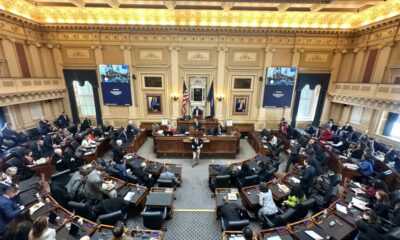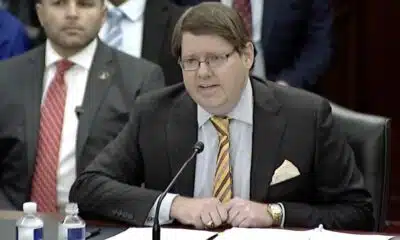News from the South - Tennessee News Feed
Memphis’ antiquated TVA contract keeps community from getting power from the sun
Memphis’ antiquated TVA contract keeps community from getting power from the sun
by Tom Hrach, Tennessee Lookout
February 19, 2025
(This story was originally published by The Institute for Public Service Reporting – Memphis.)
Memphis Light Gas and Water is taking some baby steps this year to create its own solar power system, but a major hurdle stands in the way: an antiquated contract with its power supplier.
MLGW’s exclusive power contract with the Tennessee Valley Authority forbids the city-owned utility from getting electricity from anyone but TVA.
Among 153 local power companies served by TVA, 148 have signed 20-year, long-term agreements with TVA that allow them to generate up to 5 percent of their electricity on their own. Memphis is one of the five without the long-term contract, preventing the utility from generating its own electricity.
“The community needs more energy. The demand is going up. Where are we going to get it? We do not want to burn more fossil fields, so solar is where it can come from,” said Dennis Lynch, Midtown Memphis resident and member of the MLGW citizens advisory committee.
“I could imagine many empty blocks in Memphis covered with solar panels and then people signing up to be members and getting reduced rates for electricity, but even that is not allowed in the current TVA contract.”
MLGW operates under a rolling five-year contract with TVA that dates to December 1984. That contract in Section 2B states, “TVA shall be entitled to serve directly any consumer to whom said resale rate schedules are not applicable.” The contract also states TVA retains the right to provide power to other types of customers such as the federal government and any large user of electricity. The 1984 language prevents MLGW from getting power anywhere other than TVA.
Status of a long term agreement
In 2022, MLGW discussed a 20-year long-term agreement with TVA to provide electricity to Memphis, which would have allowed the creation of its own solar power system. But that long-term agreement was never signed, so the terms of the 1984 agreement remain in place. In May 2023, MLGW CEO Doug McGowen announced that the utility would stick with TVA as its power supplier under the terms of the old contract for now.
Was that a mistake?
Not so, said Stephen Smith, executive director of the Southern Alliance for Clean Energy. That is because committing long-term to TVA means Memphis would likely never be able to get out from under TVA due to the onerous exit clauses in such a contract.
Under the terms of the current contract, MLGW must give TVA a five-year notice if it wants to leave. The long-term contract would have required a 20-year notice, which means it would be decades before Memphis could get out from under TVA.
“MLGW is losing out on clean energy, particularly, solar due to the fact that they are not independent from TVA,” Smith said. “But I do not think that signing a long-term contract would be worth it. Memphis would lose out by agreeing to stay with TVA for so long.”
One reason is that the 5 percent limit TVA places on its long-term customers is miniscule compared to the potential for solar power in West Tennessee, Smith said.
“MLGW did absolutely the right thing by not signing that long-term contract. Instead, we would like MLGW to start re-negotiating that agreement again and start using the leverage it has to encourage the use of renewable energy,” Smith said.
Baby steps to solar power
At the Oct. 2 MLGW board meeting CEO Doug McGowen outlined the capital improvement projects for 2025. He said the utility is doing what it can to move toward solar power by installing the first-ever battery storage system.
McGowen has acknowledged MLGW is prevented from creating its own solar power because of the current TVA-MLGW contract.
“We are still committed to that. I want to get the battery storage rolling first,” McGowen said at the Oct. 2 meeting. “We have some architecture and engineering money allocated for solar. We are working with our partners at TVA to determine how to do that in the constraints of our current contract. That remains a priority for us.”
Solar power would be part of what McGowen called “an aggressive expansion of capacity” to provide electricity for Memphis. At the most recent MLGW board meeting on Feb. 5, McGowen noted that the request for proposals for the battery storage would be out soon. But he offered no exact timetable. McGowen has said Memphis needs to expand the ability to provide electricity for economic growth
The best example is the establishment of the xAI facility in south Memphis, which has huge power demands. Bloomberg News reported that new artificial intelligence data centers can be drivers of economic growth for communities, but they have huge power demands. Communities that are prepared to provide increasing amounts of electricity will be the beneficiaries. And part of providing increasing amounts of electricity is that local communities need to be generating their own power instead of just buying it from someone else.
Battery storage is pivotal to plans for solar power because the sun does not shine at night, so the electricity must be generated during the day and then stored for use at other times. But a battery storage system is only the first step toward using the sun to generate electricity.
Memphis falling behind
Scott Brooks, senior relations specialist for TVA, confirmed via email that Memphis is way in the minority when it comes to developing its own power generation, writing, “Many of our partners are doing solar and community solar.”
Other TVA communities that are generating their own solar power are the Knoxville Utilities Board, BrightRidge (which serves the Tri-Cities area of Tennessee) and the Nashville Electric Service.
A 2023 study done by the Southern Alliance for Clean Energy titled “Solar in the Southeast” confirmed that Memphis was far behind Knoxville and on par with Nashville when it came to using electricity generated by the sun.
The same study showed that Memphis will be even further behind Knoxville by 2027 if things stay the same with the TVA contract. And Tennessee, which is entirely served by TVA, is miles behind the average utility in Florida, Georgia, South Carolina and North Carolina.
The goal of creating Memphis’s own solar power system is not new. It was part of the Memphis Area’s Climate Action plan written in 2020. That 222-page plan said: “Transforming our energy supply over the next 30 years will need to take an ‘all-of-the-above’ approach, with actions ranging from partnering with TVA to increase renewables in their portfolio, to encouraging and constructing local sources of renewable generation (particularly solar).”
The plan said the city of Memphis and Shelby County would work with TVA to explore changes to the MLGW contract. The report mentions solar power 35 times as a key goal for the community.
Yet more than five years since that report, no progress has been made toward establishing a local solar power system in Memphis.
Some solar power exists
Despite the restriction, solar power is not absent in Memphis. The TVA contract does not prevent companies, individuals or even government entities from putting up solar panels and generating power. The biggest solar project in Shelby County is happening at the Agricenter where thousands of vehicles whiz by five acres of solar panels on Walnut Grove Road.
That project launched in 2012 is generating enough electricity to power 110 homes per year. And it is connected with TVA’s system, showing the potential for solar power in Memphis. Shelby county government also generates electricity with the establishment of its modest collection of solar panels off of Farm Road behind the county code enforcement office.
How can Memphis start maximizing the benefits of solar power?
Citizen action is what is needed to change the situation, said Lynch, a frequent public speaker at MLGW board meetings and member of the West Tennessee Sierra Club.
“Citizens need to better understand what is the story,” Lynch said. “They need to knock on the doors of MLGW and ask what MLGW: What are you doing to allow TVA to allow us to install solar?
Tennessee Lookout is part of States Newsroom, a nonprofit news network supported by grants and a coalition of donors as a 501c(3) public charity. Tennessee Lookout maintains editorial independence. Contact Editor Holly McCall for questions: info@tennesseelookout.com.
The post Memphis’ antiquated TVA contract keeps community from getting power from the sun appeared first on tennesseelookout.com
News from the South - Tennessee News Feed
Students in Metro Nashville Public Schools head back to school this week
SUMMARY: Students in Middle Tennessee began the school year this week, with Inglewood Elementary in Nashville welcoming excited but anxious kindergartners, many born during the 2020 pandemic. Principal Whitney Russell noted their separation anxiety but said the children eased once engaged by activities and school supplies. Fourth-grader Asher expressed enthusiasm about reuniting with friends and familiar teachers. Superintendent Adrienne Battle and Mayor Freddie O’Connell greeted students on the first day, discussing new transit routes and school safety measures. Battle also addressed a $6.5 million settlement over wrongful termination claims but defended past decisions. Nearby counties started school Monday or will start Wednesday.
The post Students in Metro Nashville Public Schools head back to school this week appeared first on wpln.org
News from the South - Tennessee News Feed
Survivors of deadly fire at Memphis assisted living facility praise MFD heroics
SUMMARY: A deadly fire broke out Saturday night at the North Lake assisted living complex in Memphis, resulting in one death and critical conditions for two others. Memphis firefighters are praised for their heroic efforts, rescuing five people on stretchers and leading 15 more to safety, all while carefully handling residents with mobility challenges. Survivors and neighbors expressed gratitude for the fire crews’ quick and careful response, crediting them with preventing a higher death toll. The cause of the fire remains unknown. The Red Cross is assisting 22 displaced families as the community continues to pray for the injured and those affected.
Fire survivors praised the Memphis Fire Department (MFD) for heroic work that reduced the death toll in an assisted living …
News from the South - Tennessee News Feed
Trump pledges overhaul of school fitness tests
by Shauneen Miranda, Tennessee Lookout
August 5, 2025
WASHINGTON — President Donald Trump is bringing back a physical fitness test to public schools after over a decade, but details of the new test, including timing and implementation, remain to be seen.
Trump signed an executive order July 31 that reestablished the Presidential Fitness Test — a source of both fear and achievement among youth — and committed to revitalizing the “President’s Council on Sports, Fitness, and Nutrition,” which would develop the test.
“Rates of obesity, chronic disease, inactivity, and poor nutrition are at crisis levels, particularly among our children,” the executive order notes. “These trends weaken our economy, military readiness, academic performance, and national morale.”
The president designated Health and Human Services Secretary Robert F. Kennedy Jr. to administer the test.
Health and Human Services Secretary Robert F. Kennedy Jr. testifies during a U.S. Senate confirmation hearing on Jan. 29, 2025. (Photo by Win McNamee/Getty Images)
The council is tasked with creating “school-based programs that reward excellence in physical education and develop criteria for a Presidential Fitness Award,” according to a White House fact sheet.
Expert hopes for ‘holistic’ revamp
The order did not provide any details on what the test will look like or how or when it will roll out.
Laura Richardson, a clinical associate professor of kinesiology at the University of Michigan, said she hoped to see an updated version of the test that focused more on level of activity than on a student’s performance.
“I’m hopeful that maybe it will be reevaluated and revised and really have some tools that don’t just look at how fast you are or how strong you are, but more holistic in the tools we need to get our children to be active in childhood that should then continue through the trajectory into adulthood,” Richardson told States Newsroom.
Richardson added that testing alone would not be sufficient to see improvement in kids’ physical fitness, and called for increasing resources to schools to help students be more active.
“Sedentary behavior is really widespread — we’re seeing increasing obesity among all ages,” Richardson told States Newsroom. “We can test … but if we’re not giving the tools to the teachers and the students and the parents, we may continue to see the same data.”
Bill would codify test
Rep. Jeff Van Drew announced last week that he will introduce a bill to codify Trump’s executive order.
In a statement, the New Jersey Republican said he coordinated with the administration, including Kennedy, when writing the bill.
“Every parent wants their kid to grow up strong and healthy,” he added. “This bill is about making sure they are given the tools to do just that.”
Latest version of test
The Presidential Fitness Test dates back to President Dwight Eisenhower, who set up the President’s Council on Youth Fitness in 1956 following alarming findings on the state of youth fitness in the United States compared to youth in European nations.
The test initially included sit-ups, a mile run, a shuttle run, pull-ups or push-ups and a sit-and-reach, according to Harvard Health.
Since then, the test has seen several versions. The most recent major revamp was in 2012, when President Barack Obama’s administration replaced the Presidential Fitness Test with the Presidential Youth Fitness Program, which aimed for a more individualized and health-focused approach.
The program, which came after criticism of the Presidential Fitness Test and concerns about its psychological effects on youth, aimed to minimize “comparisons between children and instead supports students as they pursue personal fitness goals for lifelong health,” according to the Office of Disease Prevention and Health Promotion within the Department of Health and Human Services.
President John F. Kennedy, an uncle of the current HHS secretary, expanded on Eisenhower’s efforts. In a 1960 essay, “The Soft American,” the president-elect at the time described physical fitness as a “vital prerequisite to America’s realization of its full potential as a nation.”
According to HHS’ Office of Disease Prevention and Health Promotion, President Kennedy also promoted “taking the 50 mile hikes previously required of U.S. Marine officers” in a national public service advertising campaign.
President Lyndon B. Johnson established the Presidential Physical Fitness Award Program in 1966 for “exceptional achievement by 10- to 17-year-old boys and girls,” per HHS.
Last updated 3:56 p.m., Aug. 5, 2025
Tennessee Lookout is part of States Newsroom, a nonprofit news network supported by grants and a coalition of donors as a 501c(3) public charity. Tennessee Lookout maintains editorial independence. Contact Editor Holly McCall for questions: info@tennesseelookout.com.
The post Trump pledges overhaul of school fitness tests appeared first on tennesseelookout.com
Note: The following A.I. based commentary is not part of the original article, reproduced above, but is offered in the hopes that it will promote greater media literacy and critical thinking, by making any potential bias more visible to the reader –Staff Editor.
Political Bias Rating: Center-Right
The content presents a factual and straightforward account of President Donald Trump’s executive order to reinstate the Presidential Fitness Test in public schools, highlighting the administration’s perspective and goals. It includes supportive statements from a Republican lawmaker and mentions the historical context, linking back to previous Republican and Democratic presidents. While it incorporates expert opinions calling for a more holistic and resource-based approach, the coverage leans toward a positive framing of the Trump administration’s initiative without strong critique, aligning it slightly with center-right viewpoints.
-
News from the South - Texas News Feed5 days ago
Rural Texas uses THC for health and economy
-
News from the South - Texas News Feed7 days ago
Yelp names ‘Top 100 Sandwich Shops’ in the US, several Texas locations make the cut
-
Mississippi Today2 days ago
After 30 years in prison, Mississippi woman dies from cancer she says was preventable
-
News from the South - Kentucky News Feed6 days ago
Harrison County Doctor Sentenced for Unlawful Distribution of Controlled Substances
-
News from the South - Texas News Feed7 days ago
Released messages show Kerrville officials’ flood response
-
News from the South - Louisiana News Feed7 days ago
Residents along Vermilion River want cops to help prevent land loss
-
News from the South - Alabama News Feed6 days ago
Decision to unfreeze migrant education money comes too late for some kids
-
News from the South - Louisiana News Feed6 days ago
‘Half-baked’ USDA relocation irritates members of both parties on Senate Ag panel









































